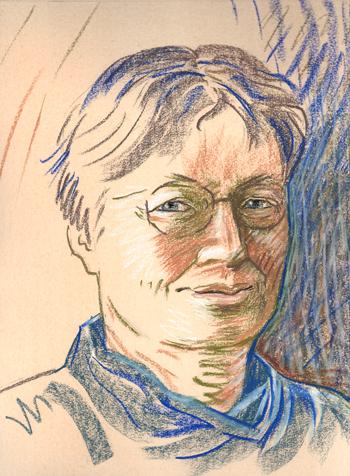“My interest in politics and history, particularly the history of social movements, has kept me coming back to video,” says documentary filmmaker, professor and activist Nancy Nicol. She’s been coming back to it for over 30 years, with a list of more than 30 films to her credit since 1979.
“In the last decade I’ve really focused on lesbian and gay rights,” she says. “I started working on this series of four films, From Criminality to Equality, in 1999, and it basically just took over.”
The series, available for purchase at nightattheindies.com, includes the films Stand Together, The Queer Nineties, Politics of the Heart and The End of Second Class. Together, they explore the history of lesbian, gay, bi and trans (LGBT) rights in Canada.
“They’re about the relationship between grassroots organizing, the building of a social movement, and its ability to actually challenge and change the laws around sexual orientation and family, parenting, marriage, and all of that. But the series combines interviews with grassroots organizers, and lawyers and government officials who responded or didn’t respond and gives a larger national overview of that history over a period of 40 years.”
Nicol’s latest film, Dykes Planning Tykes: Queering the Family Tree, is set to premiere at the Inside Out Film Festival on May 28 at 1pm. The film takes a look at the Toronto-based parenting program of the same name, which was founded in 1997 and continues to support lesbian and queer-identified women from its home at the Sherbourne Health Centre. The group commissioned the film for its 10th anniversary three years ago.
“Dykes Planning Tykes is a smaller history, if you like, more about a small local organization in Toronto that has also ballooned into a significant program that has touched the lives of hundreds of lesbians and queer-identified women who have gone through this program.”
The kid-friendly premiere will be followed by a panel discussion with Nancy Nicol, Rachel Epstein, Nila Gupta, Chris Veldohoven and Syrus Marcus Ware, who will talk about new developments in queer and trans family planning. Tickets are available at insideout.ca.
As if a rich and productive career in documentary-making weren’t enough, Nicol also works a professor and researcher in the Faculty of Fine Arts at York University as well as being a faculty associate in York’s Centre for Feminist Research. She was recently granted $1 million in funding over five years in the form of a Community-University Research Alliance award from the Social Sciences and Humanities Research Council of Canada for a project called Envisioning Global LGBT Human Rights, a collaborative endeavour with a 22-member research team and with 32 community and organizational partners across the globe. The project will explore how LGBT and human rights groups resist the criminalization of sexual orientation and gender identity.
“The idea is to focus on the legacy of the British criminal code that criminalizes people based on their sexual orientation or gender identity,” explains Nicol. “Those laws now represent half of the laws that continue to criminalize us in the contemporary world. If you look at the Commonwealth, about 70 percent criminalize, and they do so under laws set in place in the colonial period. When you look at the rest of countries, about 32 percent criminalize. So the role of the British laws is profound and continues to be profound. It’s of course the origin of the law we had in Canada up until 1969.”
The project includes partners from Uganda, Kenya, India, Botswana, Belize, Jamaica and Guyana as well as Canadian partners such as Egale Canada, the Inside Out Film Festival, Black CAP, Rainbow Health Ontario and others. “It’s a large research team and a multidisciplinary team. But we all have in common a commitment to this shared work.”
According to Nicol, the Envisioning project will focus on three main aspects: decriminalization, resistance and asylum. The asylum portion of the project focuses specifically on Canada and South Africa.
In addition to acting as the chief coordinator of the project, Nichol will be making documentaries about the activist work being done in several of the countries, and in training community members in other countries to do participatory video shoots themselves.
“Everything will be translated and transcribed, and the research team will have access to all the transcripts to develop recommendations, policy papers and so forth. It’s a five-year project which will probably end up being seven,” she grins. “It’s huge but we will accomplish a lot with this work.”
She lists the expected outcomes: two documentary films, six or seven participatory video projects, and a number of academic papers, policy recommendations and reports.
“But the larger result is that it also creates this network of communication and exchange, which is part, I think, of building these international movements to support and advance human rights,” she says.
With all this, it’s only fitting that Nicol would be earning the recognition of her peers. On May 26 at 7pm at Buddies in Bad Times Theatre, she’ll be inducted into the Canadian Lesbian and Gay Archives’ National Portrait Gallery, which features portraits of individuals who, according to the Portrait Gallery website, “have made significant contributions to the growth of diverse, out and proud lesbian, gay, bisexual and trans (LGBT) communities in Canada.”
Nicol is especially pleased because the artist commissioned to do her portrait is none other than her partner, Rainbow Health Ontario representative and long-time activist Phyllis Waugh.
“We met after art school, and we’ve been together for 26 years.”
It’s a nice touch—and it certainly makes for a fitting testament to Nancy Nicol’s staying power.
Film premiere
Dykes Planning Tykes: Queering the Family Tree
Part of the Inside Out Film Festival
May 28, 1pm
Portrait induction
Part of the Canadian Lesbian and Gay Archives’ National Portrait Gallery
Buddies in Bad Times
May 26, 7pm
$18, clga.ca/npc


 Why you can trust Xtra
Why you can trust Xtra


